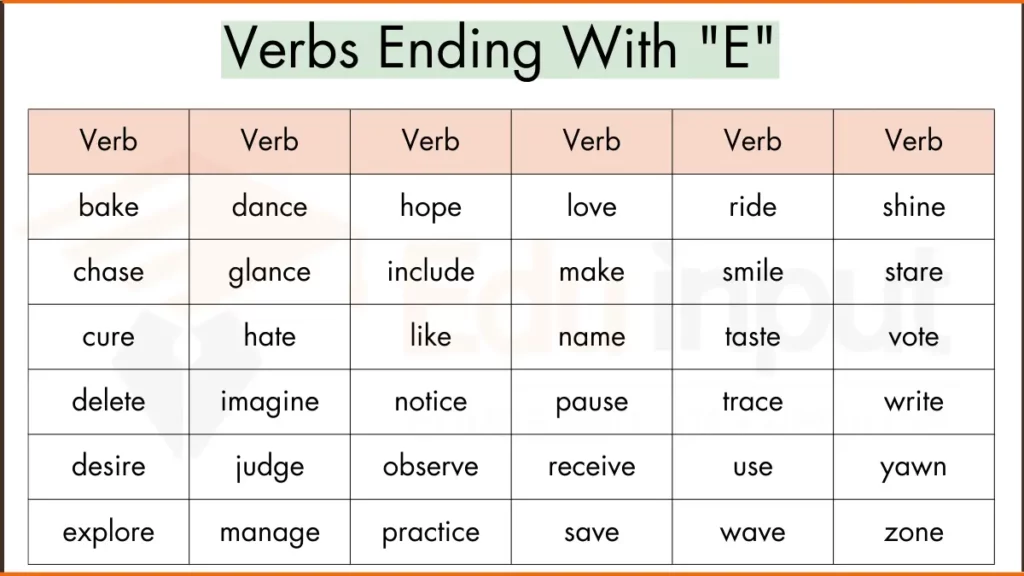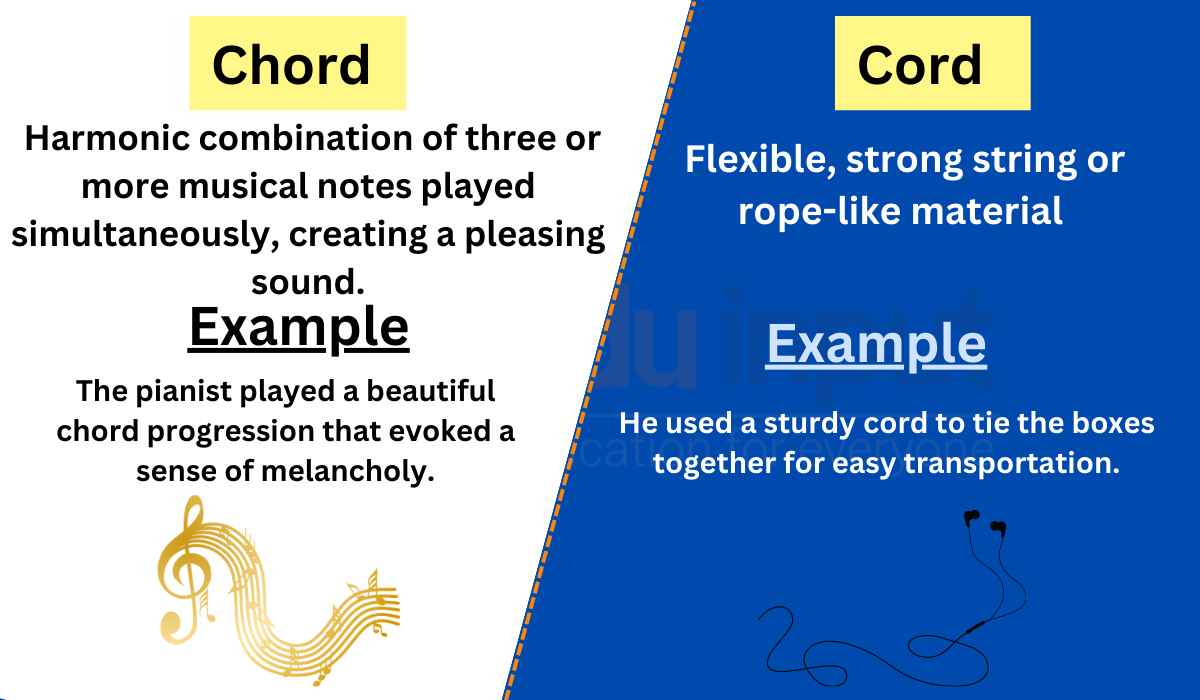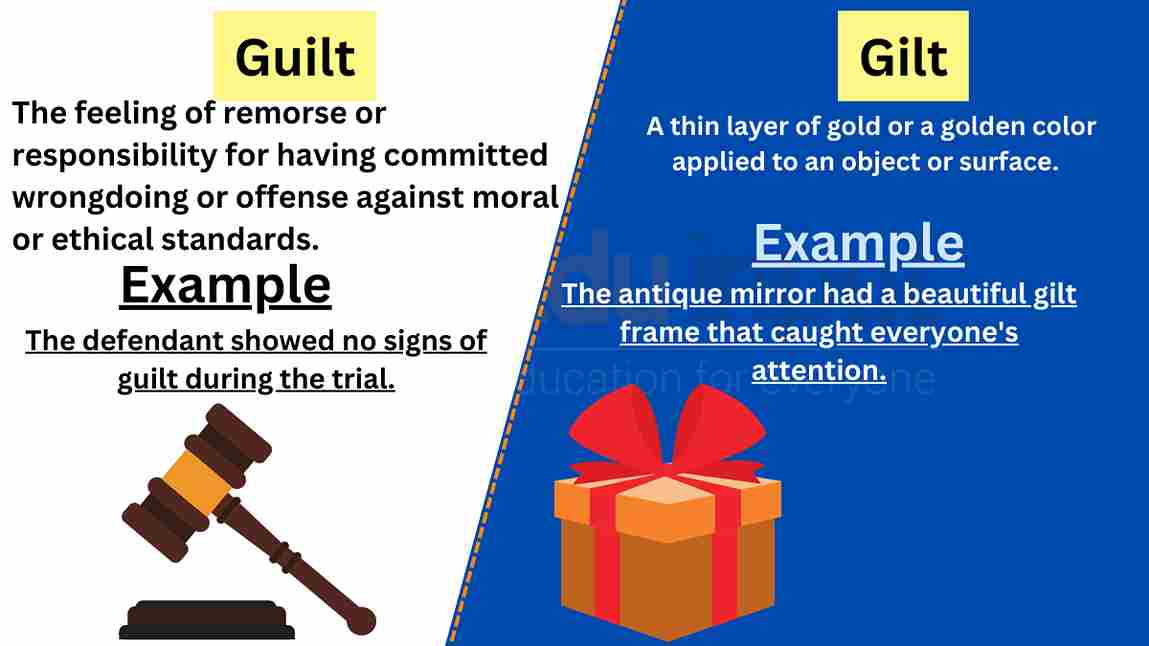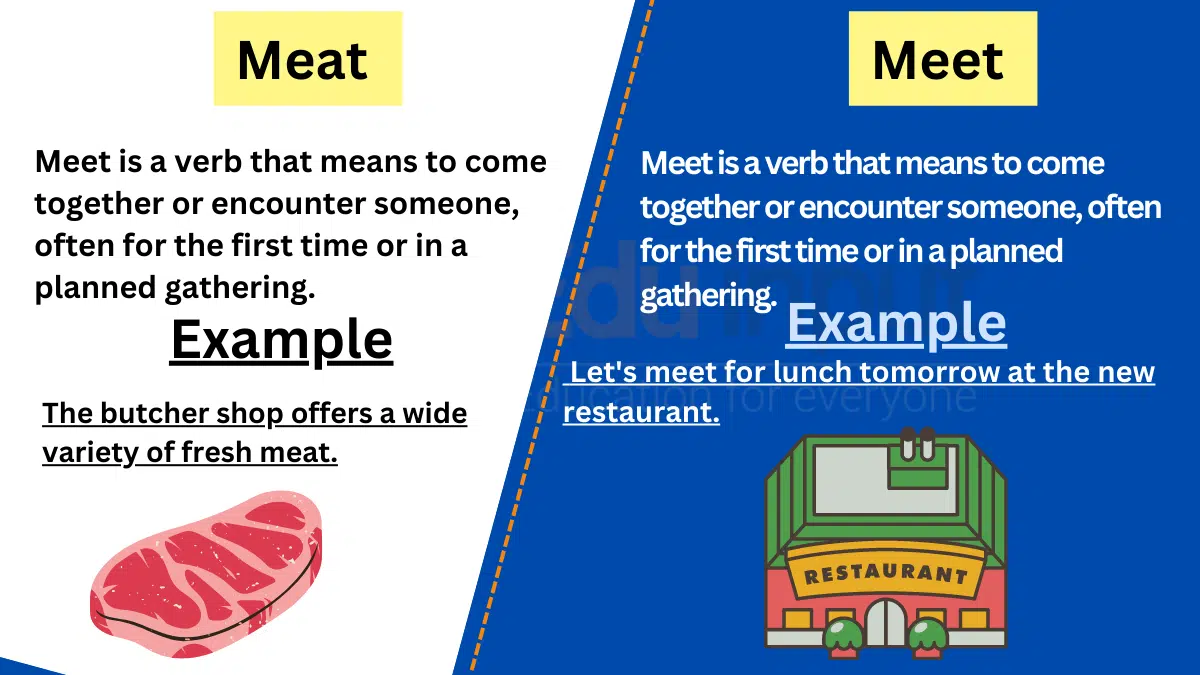50 Verbs ending in “e”
March 30, 2024
In this article, we will discuss multiple verbs ending with “e”, their meaning, and usage in sentences.

Verbs Ending With”e”
| Word | Meaning | Sentence |
| Absolve | To free someone from blame or guilt | The judge absolved him of all crimes. |
| Accuse | To charge someone with wrongdoing | The police accused him of stealing. |
| Admire | To feel respect or approval for someone or something | He admired her talent as a musician. |
| Advise | To offer suggestions or recommendations | The doctor advised him to avoid caffeine and sugar. |
| Advertise | to promote or publicize a product or service | The company advertised their new product on television. |
| Aggravate | To make a situation worse or more tense | Her constant complaining aggravated his headache. |
| Agonize | To suffer great physical or mental pain | She agonized over which dress to wear to the party. |
| Appreciate | To recognize or understand the value or worth of something/someone | She appreciated the thoughtful gift from her friend. |
| Assemble | To gather or put together into a whole | They assembled the new furniture in the living room. |
| Attune | To adjust or become compatible with something/someone | She attuned her guitar before the show. |
| Authenticate | To prove or confirm the genuineness or validity of something | The expert authenticated the ancient artifact. |
| Balance | To counteract or adjust to maintain stability or equality | He balanced the books at the end of the month. |
| Believe | To accept something as true or correct | She believed in the power of positive thinking. |
| Calculate | To determine by mathematical or logical reasoning. | He calculated the cost of the project before submitting a proposal |
| Celebrate | To observe or honor an event or occasion with festivities | They celebrated their wedding anniversary with a romantic dinner. |
| Challenge | To question or dispute the validity of something. | The activist challenged the government’s decision to cut down the trees. |
| Charge | To make a formal accusation of wrongdoing | The prosecutor charged him with embezzlement. |
| Collate | To collect and arrange in order | She collated the papers before submitting the report. |
| Collaborate | To work together with others for a common goal or project | The team collaborated on the research project. |
| Confuse | To cause someone to feel bewildered or uncertain | The complicated instructions confused the new employee. |
| Commence | To begin or start | The ceremony will commence at noon. |
| Conceive | To formulate or develop an idea or plan | They conceived of a new marketing strategy for their product. |
| Congregate | To come together in a group or gathering | The protesters congregated at the town hall. |
| Conjugate | To inflect or change the form of a verb to express tense or mood | She conjugated the Italian verb “parlare” in the present tense. |
| Consume | To eat, drink, or use up something | He consumed a large pizza by himself. |
| Cooperate | To work together or act jointly with others | The different departments cooperated to complete the project. |
| Coordinate | To plan or organize something to ensure it is harmonious or efficient | She coordinated a surprise party for her friend’s birthday. |
| Create | To bring something new into existence or give rise to something | She created a beautiful painting that won an award. |
| Cultivate | To promote and develop a skill or relationship with someone/something | He cultivated a love for gardening in his children. |
| Cure | To heal or make free from disease or illness | The medicine cured her cold within a few days. |
| Dare | To have the courage or audacity to do something | He dared to swim with the sharks. |
| Declare | To formally announce or affirm something | The president declared war. |
| Deflate | to release air or reduce the size or confidence of something | She deflated the balloon to make it easier to carry |
| Deliberate | -to consider or ponder something carefully before making a decision | She took deliberate steps toward the podium. |
| Demonstrate | to show or make evident by example or explanation | She demonstrated how to use the new software program |
| Depreciate | to decrease or lower the value or importance of something/someone | The car depreciated in value after it was in an accident. |
| Deviate | To depart from a norm or standard | The behavior of the child started to deviate from the expected |
| Differentiate | To distinguish or separate something/someone from others. | She differentiated between the different species of birds. |
| Dilute | To make something weaker or less concentrated | She dilutes the juice with water to make it less sweet. |
| Direct | To guide or control the course of something/someone | The coach directed the team to victory. |
| Disengage | to separate or detach from something/someone | She disengages from social media to focus on work. |
| Dispute | To argue or debate the validity or truth of something/someone | The lawyers disputed the facts of the case. |
| Dominate | To control or govern something/someone by power or influence | The giant corporation dominates the market share. |
| Duplicate | To copy or reproduce something exactly | She made a duplicate of the key just in case she lost the original. |
| Donate | To give or contribute something, usually to a charity or cause | She donated her old clothes to the homeless shelter. |
| Encourage | To inspire or give support or confidence to someone | The coach encouraged his players to do their best. |
| Enlarge | To increase the size or scope of something | They enlarged the image to clearly see the details. |
| Elucidate | To make clear or explain something | She elucidated the complicated concept with a simple example. |
Also Read:
File Under:







Leave a Reply